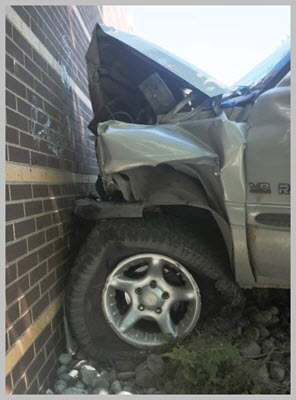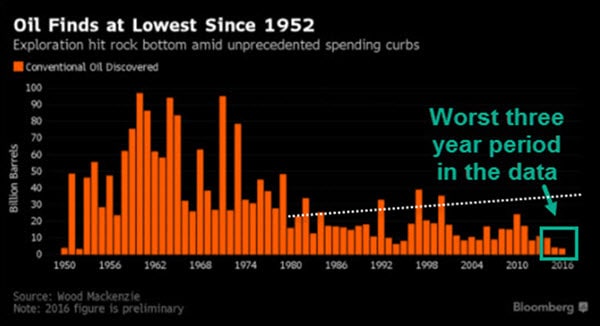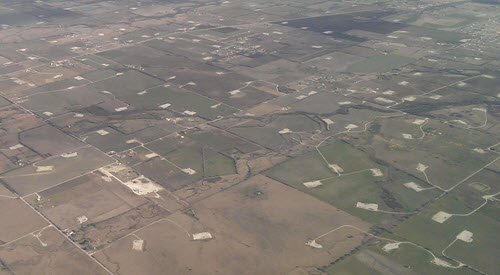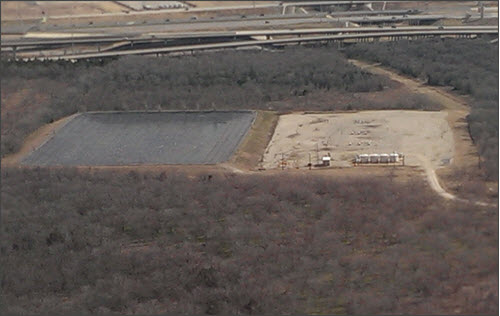While life has always been uncertain, today our choices matter more than ever. The decisions each of us make today will determine if we thrive, merely survive, or fail during the future time of upheaval ahead.
The window of opportunity to change course for humanity is all but closed. There’s simpply no more time to hope that somehow, magically, the world's entire energy complex will suddently evolve to a bountiful and sustainable new plane -- whether by market forces, by maverick billionaires like Elon Musk, or by happy accident.
As we hammer home constantly here at Peak Prosperity, energy is everything. Without it, our society simply can't function.
And it's critical to appreciate that it takes an investment of energy to migrate from energy solution to another.
Imagine you heat your house with wood, but want to switch to a forced air gas furnace. Is there energy involved in doing so? You bet there is. Besides the obvious new need for natural gas, there’s a huge amount of embodied energy in the manufacture and installation of your new furnace, all the duct work, and the delivery lines that will bring the gas to the furnace. Further, there will be electricity required to force the air from the furnace, through the ducts, and into your house.
The same is true when making transitions at the national level. What’s involved in the much larger projects of switching industrial agriculture away from the fossil fuel driven process of plowing, planting, fertilizing, irrigating, harvesting, drying or cooling, and then transporting food from the field to your table?
At each stage there’s an enormous amount of energy infrastructure that needs to be rebuilt and reconfigured to run on “something else.” Let's examine the current dream that we'll switchover to powering all of our farming needs with electricity.
The manufacture of the tractors and their thousands of components all have to be completely reconfigured to run on electricity -- from the act of mining and smelting the metals used all the way through assembly and delivery to the farmer. At present, oil and other fossil fuel inputs are pretty much 100% of that process. The same is true for all of the other equipment and tools currently used in farming.
Could we do all this using electicity instead? Yes, of course.
Will it happen all on its own while we wait for “market forces” to do the job? Nope. Not a chance.
Why? Because it's far cheaper, faster and easier to use fossil fuels. And humans are nothing if not lazy. Give us a cheaper and easier option and we’ll take it every single time. Which is no different really from a cheetah selecting a lame or slower gazelle over a faster and stronger one. It’s just how Nature works.
Waiting for “market forces” to magically replace an already-embedded, cheaper and easier energy source is hopeless. Absent a crisis that forces us to, as a society, we’d have to proactively decide to make that transition a top national priority and become deadly serious in our pursuit of it. And if we actually were to do this, it would certainly be a painful process for a good while.
Huge job losses and dislocations would result, as whole categories of jobs become irrelevant and vast swaths of the labor force go through re-skilling. Our economy's “growth forever” model would come tumbling down because it’s been heavily subsidized by cheap surplus fossil energy. That would no longer be the case. So stocks, bonds and real estate would tumble, ruining the retirement dreams for many.
It would prove difficult to run a top-notch military (which burns through oil and other critical resources like nobody’s business), feed everyone, travel as we do, and heat and cool everything. We’d probably have to make material sacrifices across each -- or give up one or more of them entirely.
The point here is that, in the ten years I have personally been banging on the drums of logic and reason, I can honestly say that virtually no progress has been made towards developing a credible action plan for weaning the global economy off of fossil fuel. Humanity seems fully committed to its current trajectory: the cheap and easy path. At least, until something forces our hand.
Which makes us no different from any other biological organism. No different than the simplest bacterium in a petrie dish that multiplies until it has consumed its food supply, then is suddenly faced with starvation.
The outcome of our current "cheap, fast and easy" trajectory is the same as a car hurtling towards a brick wall at a very high rate of speed. It will come to a predictable, sudden, and painful end:
One of the saddest elements of this story is that we've had many chances to reform ourselves along the way. Economically, we could have (and should have) used the crisis of 2008 to allow a bunch of literally useless financial firms bite the dust. But didn't; we saved them all. And now have a Too Big To Fail system that’s even "Too Bigger" than before [sic].
Or we could have starting planning for a move away from fossil fuels back in 1957 when Admiral Hyman Rickover noted:
The earth is finite. Fossil fuels are not renewable. In this respect our energy base differs from that of all earlier civilizations. They could have maintained their energy supply by careful cultivation. We cannot. Fuel that has been burned is gone forever. Fuel is even more evanescent than metals. Metals, too, are non-renewable resources threatened with ultimate extinction, but something can be salvaged from scrap. Fuel leaves no scrap and there is nothing man can do to rebuild exhausted fossil fuel reserves. They were created by solar energy 500 million years ago and took eons to grow to their present volume.
I suggest that this is a good time to think soberly about our responsibilities to our descendants - those who will ring out the Fossil Fuel Age. Our greatest responsibility, as parents and as citizens, is to give America 's youngsters the best possible education.
We might even - if we wanted - give a break to these youngsters by cutting fuel and metal consumption a little here and there so as to provide a safer margin for the necessary adjustments which eventually must be made in a world without fossil fuels.
One final thought I should like to leave with you. High-energy consumption has always been a prerequisite of political power. The tendency is for political power to be concentrated in an ever-smaller number of countries. Ultimately, the nation which control - the largest energy resources will become dominant. If we give thought to the problem of energy resources, if we act wisely and in time to conserve what we have and prepare well for necessary future changes, we shall insure this dominant position for our own country.
Such amazing and easily understood insights by one of the most intelligent accomplished people in US history. And that was just a very small set of snippets from a longer speech (you can read his full speech in PeakProsperity.com's Essential Articles section).
In thes few paragraphs above, Rickover lays out that:
- The Earth is finite.
- Fossil fuels are not renewable.
- Burn them and they are gone.
- A little self-sacrifice today would go a long way in the future.
- Energy output creates political power.
- Therefore conserving and controlling energy are determined by political will.
Most of the world is still behaving as if these simple points are too confusing to digest. As if there were some other, more hopeful, outcome to our reckless behavior of frittering away such a valuable and non-renewable resource on such blind pursuits as expanding the world’s population to some eventual maximum, destroying topsoil and ecosystems, and selling as many SUV’s and trucks as humanly possible in any given quarter.
There’s only one outcome for any organism that grows until it slams into the limit of its energy boundary: Collapse.
Is there any evidence we're in danger running into that boundary soon? Absolutely.
Important warning signs we'd expect to see in the oil space would be declining discoveries and increasingly desperate attempts to scrape the bottom of the barrel.
Both signs are upon us with vigor these days.
First, we see that oil discoveries are at their worst over the entire data series stretching back to the early 1950’s:
The white dotted line in the above chart indicates that, four years excepted, the level of discoveries has been well below consumption since 1980. And the yearly gap has been growing over that timeframe.
Consuming more of a non-renewable resource than you're finding? It doesn’t take a geologist or a math whiz to work out the implications of that story.
Next, for warning sign #2, take a look at these photos I shot on a recent trip as my plane was landing in Dallas:
Each one of those little white squares is a one to two-acre drill/production pad. The earth is scraped away, the drill rig brought in, then the fracking and finishing trucks arrive – some 1,200 truck trips in all – just to poke a single hole that will (hopefully) produce a few hundred thousand barrels of oil.
Here’s a drill pad on close look as the plane was landing, showing also an associated waste pond where the fracking fluid that blows back up the drill hole is captured for later disposal. These ponds need to be big, because millions of gallons of wastewater is produced at first, often laced with highly toxic compounds.
The above are perfectly good warning signs that we’re out of the good options. The days of gigantic deposits of easily-extractable oil are gone. Now we’ve got this stuff. It's smaller, lower quality, and requires a *lot* more energy/effort to get out of the ground.
Of course, that's not stopping us from going after it. And I’m not (necessarily) against that, as long as we admit to ourselves how extreme these measures are, and what this means for our future.
Where the Romans had their omens and auguries, the rise of oil fracking is an important portent of what lies ahead for modern society. Art Berman refers to the current shale bonanza not as a "revolution", but as a "retirement party" -- and he’s right.
What happens after someone's retirement party? Life winds down. The energy of their youth is no longer with them. The same is coming true today for America.
Conclusion
Nothing grows forever. Cancer tries, but always defeats itself in the process. Yeast parties until all the sugar in the vat is gone or it pollutes itself out of an active existence.
Can humans do better? The jury is still out on that.
But so far, the signs say that, as a group, we lack the ability to organize effectively against big, complex challenges. Especially if doing so requires us to willingly choose to live a life of less. We're simply too addicted to more.
Admiral Rickover suggested that living within our means would be a smart and honorable thing to do for future generations. But his speech represents something of a high-water mark for conscientious thinking at the government official level.
Here’s the thing: Unless there’s a very sudden and rapid change in how we are approaching the looming brick wall of resource shortages, the future is going to be quite difficult.
Most people will be caught unprepared. As a result, many of them will suffer, and possibly fail completely to continue on.
A smaller few will survive, stoically soldiering on.
But an even smaller percentage -- those who heeded the warning signs and prepared prudently in advance -- will be positioned to thrive through the coming adversity.
Where I have lost my faith in large groups of people, I have more faith than ever in those prospects for "awake" individuals and small groups. I'm inspired by the number of people I’ve met who are taking smart, regenerative, innovative steps to align their personal actions with the big picture realities discussed above.
To those already pursuing resilience: I know it’s not easy staying focused and on track. The Powers That Be have poured considerable resources and effort into painting the illusion that "All is well". They’ve poured $trillions into the stock and bond ""markets"", in part to send a false signal of comfort, so that people will not spook and instead continue to borrow and buy. They, along with the compliant corporate-controlled media, have committed vast sins of commission and omission in the narratives that they choose to promote or suppress.
Bubbles are powerful social signaling devices. Staying out of them and out of harm’s way is really difficult, especially as the party rages hardest right before its end. One of the responsibilities we at Peak Prosperity take most seriously is reminding you of the dangerous seduction of asset bubbles. Don't get taken in. Don't be the "greatest fool" who capitulates and jumps in right before the crash (remember: even Isaac Newton got suckered by the South Sea Bubble).
And in Part 2: What I Am Personally Doing To Prepare Right Now, I detail what I am doing in my life right now to make good decisions in difficult times. Many of you have been asking about which specific steps I'm prioritizing these days. Well, I'm answering.
Look, someday this ridiculous era of the Everything Bubble will be over. First, it’s going to get a little bumpy -- and then, really bumpy.
When that time comes, hope the preparations you've made in advance will be enough to see you through, and hold fast. Then hang on for as long as you can.
Click here to read Part 2 of this report (free executive summary, enrollment required for full access
This is a companion discussion topic for the original entry at https://peakprosperity.com/our-delusional-economy-is-poised-to-slam-into-the-brick-wall-of-reality/




